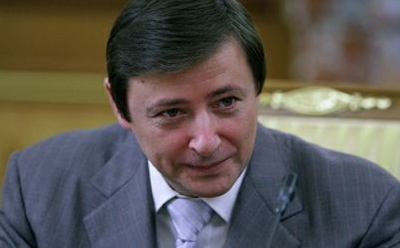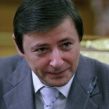
North Caucasus Stays High on the Russian Political Agenda as Presidential Elections Approach
Publication: Eurasia Daily Monitor Volume: 9 Issue: 15
By:

On January 23, Russian Prime Minister Vladimir Putin published an article about ethnic relations in the Russian Federation. This was Putin’s second article to appear in the Russian press recently as he gears up for presidential elections in the country in March 2012. To a large extent, the article is implicitly devoted to Moscow’s policy toward the North Caucasus. Putin proclaims ethnic Russians “state constituting people” – something Russian nationalists had advocated for previously. At the same time, Putin compares those demonstrating under the banner “Stop Feeding the Caucasus” to the people who broke up the Soviet Union. The prime minister proclaims that the self-determination of the ethnic Russian people is as part of a “poly-ethnic civilization, united by a Russian cultural core” (https://www.ng.ru/politics/2012-01-23/1_national.html).
The uniqueness of the Russian civilization, according to Putin, allowed it to function in such a way that all ethnicities and religious groups would preserve their identities, while still constituting one state. Putin does not mention, of course, that the Russian Empire effaced some peoples while it “developed the new lands,” such as several branches of the Circassian people in the North Caucasus. There were a few multinational empires whose modus operandi in regard to national minorities was very similar to that of the Russian Empire, so it is hardly part of a unique Russian identity. The real question appears to be that while ethnic Russian people increasingly feel vulnerable with the influx of significant non-Russian ethnicities, Moscow is trying to revive the old imperial system of ethnic Russians dominance, but combine it with the rhetoric of an egalitarian society.
In his article, Putin pensively elaborates on restoring popular elections for regional governors. He vows to outlaw the creation of any regional parties, especially in the republics, as this, according to the prime minister, would lead to separatism. Most importantly, he states that those gubernatorial candidates who attempt to rely on “nationalist, separatist and other such forces should be immediately, within the framework of democratic and legal procedures, excluded from the electoral process” (https://www.ng.ru/politics/2012-01-23/1_national.html, January 23). It is unclear how and who will decide whether candidates in regional elections are depending on destructive forces. From Putin’s words it can be concluded that the Russian president will still have a mechanism in place, which will allow him to weed out unwanted gubernatorial candidates. It is likely that along with “separatists” and “nationalists,” candidates who are disliked by the president for other reasons will also face an uphill battle to make it onto election ballots.
Putin also advocates for the reform of the education system to promote allegiance to the Russian state among young people. At the same time, he promises to toughen migration rules inside the country and even introduce criminal liability for breaking these rules. The prime minister specifically mentions internal migration from the North Caucasus to the rest of Russia, causing multiple problems. Putin calls on the “guests,” who are Russian citizens by birth, to respect the culture and way of life of those territories where they arrive (https://www.ng.ru/politics/2012-01-23/1_national.html, January 23).
Apart from the peculiar combination of forcing a state doctrine on young people in order to prevent separatism, on the one hand, and increasing internal migration controls, on the other, there is yet another dubious part in Putin’s declarations that the voters might discern. Namely, Putin criticizes the police and other Russian state institutions for corruption that results in interethnic strife. But Putin has been in charge of the Russian state since 1999, and it is unclear how he can avoid responsibility for the spread of corruption and how much more time he needs to resolve the problem. In his attempt to strike a middle ground between “Soviet internationalism” and Russian nationalism, Putin might lose both of these camps. In practice, though, the rhetorical part about “Soviet internationalism” will remain mere rhetoric, while the demands of Russian nationalists will increasingly be implemented.
Meanwhile, on January 20, Moscow’s envoy to the North Caucasus, Aleksandr Khloponin, stated at an Interior Ministry meeting that the North Caucasus was the largest venue for money laundering in the Russian Federation. The insurgency continues to receive funds from their supporters and the North Caucasus’ authorities and criminals are merging. It was not immediately clear whether Khloponin meant that local authorities were merging with the insurgents or just with ordinary criminals (https://www.gazeta.ru/news/business/2012/01/20/n_2173217.shtml, January 20).
At a North Caucasus Public Chamber meeting on January 19, Khloponin proposed a state monopoly on the newly created brand “Made in the North Caucasus.” Khloponin’s proposal was the latest manifestation of Moscow’s push to monopolize economic life in the North Caucasus and, through economic control of the region, make it more governable and loyal to the central Russian government (https://karachaevo-cherkesia.kavkaz-uzel.ru/articles/199535/, January 19).
In other areas, the Russian government continues to press ahead with developing tourism in the North Caucasus. The general manager of the state company Resorts of the North Caucasus, Aleksandr Nevsky, painted a rosy picture of the region by 2025, saying that by then there will be 300,000 newly created jobs, an additional $4 billion in tax revenues and 10 million tourists every year (https://karachaevo-cherkesia.kavkaz-uzel.ru/articles/199572/, January 20). The project to develop tourism has been in place now for one and a half years, but so far it is unclear who will finance the project and how the insurgent threat will be mediated.
A more realistic and politically driven project of amalgamating the territories where the administrative borders of Stavropol region, Karachaevo-Cherkessia and Kabardino-Balkaria meet is mentioned increasingly often. Khloponin, acting on personal instructions from Putin, is set to create the new region of Kavminvody in the south of Stavropol region and bring it under Moscow’s direct control. The new region is supposed to extend its economic influence to the nearby districts of Kabardino-Balkaria and Karachaevo-Cherkessia (https://karachaevo-cherkesia.kavkaz-uzel.ru/articles/199572/, January 20). This is apparently thought of as an amalgamation experiment for the North Caucasus that could eliminate the republics as they are currently constituted, or at least render them meaningless by organizing alternative administrative and economic frameworks.
With the North Caucasus increasing the intensity of the issue of ethnic relations in Russia, the region’s importance in Russian politics remains high. With Russian nationalism rising, the government in Moscow is becoming increasingly responsive to Russian nationalist demands.




